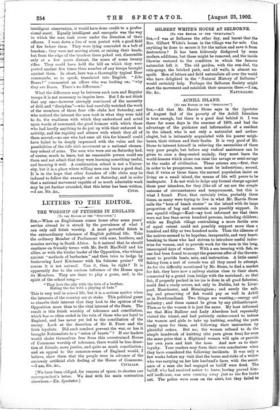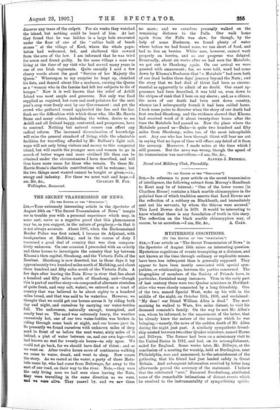ACHILL ISLAND.
(To THE EDITOR OP THE "SPECTATOR.") SIR,—All that Mr. Harris Stone says in the Spectator of August 2nd of the poverty of the Achill Islanders is true enough, but there is a good deal behind it. I was there for some days in the summer of 1899, and had the advantage of the guidance and information of a resident in the island, who is not only a naturalist and archae- ologist, but is intimately acquainted with his poorer neigh. hours, their virtues and their faults. It is very good of Mr. Stone to interest himself in relieving the necessities of these very poor people, but before any radical assistance can be given to cure a deep-seated malady, they must learn the world-lessons which alone can raise the savage or semi-savage to the ranks of civilisation. These axioms are,—first, that in order to be prosperous, men must be industrious ; second, that if twice or three times the normal population insist on living on a small island, the means of life will prove to be inadequate. I do not wish to lodge any formal charge against these poor islanders, for they (like all of us) are the simple outcome of circumstances and temperament, but this is what I found. First, that certainly twice, probably three times, as many were trying to live in what Mr. Harris Stone calls the " huts of beach stones " as the island with its large proportion of bog and mountain can possibly support. In one squalid village—Keel—my host informed me that there were not less than seven hundred persons, including children; while an English village centralising a more fertile area of equal extent could not possibly support more than a hundred and fifty or two hundred souls. Then the idleness of the natives seemed to be hopeless, insuperable, and very heart- breaking to those who had striven to introduce useful indus- tries for women, and to provide work for the men in the long. unoccupied days of winter. With a sea teeming with fish, no one had been found to accept the generous offer of the Govern- ment to provide boats, nets, and instruction. A little casual fishing from a sort of coracle was all they cared to attempt. As for the difficulty mentioned by Mr. Stone, to find a market for fish, they have now a railway station close to their shore, connected by a grand iron bridge with the mainland ; so that fish, if properly packed in ice (as is done in all good fisheries), could find a ready access, not only to Dublin, but to Liver- pool, Manchester, and Birmingham ; and surely the salt- ing and preserving of fish would pay as well in Achill as in Newfoundland. Two things are wanting,—energy and industry ; and these cannot be given by any philanthropist. Then as to the women it is just the same. My host informed me that Miss Balfour and Lady Aberdeen had repeatedly visited the island, and had patiently endeavoured to induce the women and girls to take up knitting, sending the yarn ready spun for them, and following their• instruction by plentiful orders. But no; the women refused to do the simple handwork of knitting (the yarn given free) for even the same price that a Highland woman will spin or provide her own yarn and knit the hose. And now as to their loyalty. Your readers may form their own conclusions when they have considered the following incidents. It was only a few weeks before my visit that the barns and ricks of a widow who was carrying on her late husband's farm with the assist- ance of a man she had engaged as bailiff were fired. The bailiff, who had received notice to leave, having proved him- self inefficient, was seen running away just as the fire broke out. The police were soon on the alert, but they failed to discover any trace of the.culprit. For six weeks they watched the island, but nothing could be heard of him. At last they found that he was hidden in a large hole excavated under the floor of one of the " cabins built of beach stones " at the village of Keel, where the whole popu- lation had welcomed, fed, . and sheltered this coward from the arm of the law. I am informed that he was tried for arson and found guilty. In the same village a man was living at the time of my visit who had served many years in one of our Irish regiments. Quite casually I said a few cheery words about the good " Service of her Majesty the Queen." Whereupon to my surprise he leapt up, clenched his fists, and danced about like a madman, cursing the Queen as a ".woman who in the famine had left her subjects to die of hunger." Now it is well known that the relief of Achill Island was most ample and generous.. Not only was food supplied as required, but corn and seed-potatoes for the next year's crop were freely sent by our Government : and yet the crowd who gathered round applauded the lies and the liar. Such are the difficulties with which those who, like Mr. Harris Stone and many others, including the writer, desire to see Achill and all Ireland happy, contented, and prosperous, hare to contend. Nothing but natural causes can effect any radical reform. The increased dissemination of knowledge will raise the general standard of living, while the admirable facilities for travelling afforded by Mr. Balfour's light rail- ways will not only bring visitors and money to this congested island, but will enable the younger men and women to go in search of better wages and more civilised life than can be obtained under the circumstances I have described, and will thus leave more room for those who remain. To these Mr. Harris Stone's charitable contributions will be welcome ; but the two things most wanted cannot be bought or given,—i.e., energy and industry. For these we must wait and hope.—I







































 Previous page
Previous page